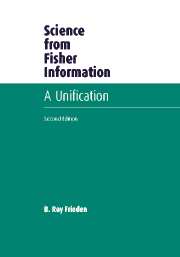Crossref Citations
This Book has been
cited by the following publications. This list is generated based on data provided by Crossref.
Hawkes, P.W.
2004.
Microscopy, mathematics, measurements and Moses.
Ultramicroscopy,
Vol. 101,
Issue. 2-4,
p.
73.
Plastino, A. R.
and
Daffertshofer, A.
2004.
Liouville Dynamics and the Conservation of Classical Information.
Physical Review Letters,
Vol. 93,
Issue. 13,
BİNİCİOĞLU, SİNEM
ÇAKIR, ÖZGÜR
KLYACHKO, ALEXANDER A.
and
SHUMOVSKY, ALEXANDER S.
2005.
GENERIC ENTANGLED STATES AS THE su(2) PHASE STATES.
International Journal of Quantum Information,
Vol. 03,
Issue. 04,
p.
661.
Vlad, Marcel O.
Szedlacsek, Stefan E.
Pourmand, Nader
Cavalli-Sforza, L. Luca
Oefner, Peter
and
Ross, John
2005.
Fisher's theorems for multivariable, time- and space-dependent systems, with applications in population genetics and chemical kinetics.
Proceedings of the National Academy of Sciences,
Vol. 102,
Issue. 28,
p.
9848.
Gonz�lez-F�rez, R.
and
Dehesa, J. S.
2005.
Characterization of atomic avoided crossings by means of Fisher?s information.
The European Physical Journal D,
Vol. 32,
Issue. 1,
p.
39.
Solomon, J.
Butman, J.A.
and
Sood, A.
2005.
Segmentation of objects in temporal images using the hidden Markov model.
p.
I.
Chen, Zeqian
2005.
Wigner-Yanase skew information as tests for quantum entanglement.
Physical Review A,
Vol. 71,
Issue. 5,
Faul, S.
Boylan, G.
Connolly, S.
Marnane, W.
and
Lightbody, G.
2005.
Chaos theory analysis of the newborn EEG- Is it worth the wait?.
p.
381.
Frieden, B.R.
Yolles, M.I.
and
Kemp, G.
2005.
A metahistorical information theory of social change: an application.
Journal of Organisational Transformation & Social Change,
Vol. 2,
Issue. 2,
p.
137.
Frieden, B. Roy
and
Gatenby, Robert A.
2005.
Power laws of complex systems from extreme physical information.
Physical Review E,
Vol. 72,
Issue. 3,
Luo, Shunlong
2006.
Quantum uncertainty of mixed states based on skew information.
Physical Review A,
Vol. 73,
Issue. 2,
Shun-Long, Luo
2006.
Fisher Information of Wavefunctions: Classical and Quantum.
Chinese Physics Letters,
Vol. 23,
Issue. 12,
p.
3127.
Jeong, Youngsul
Sanders, Brett F.
and
Grant, Stanley B.
2006.
The Information Content of High-Frequency Environmental Monitoring Data Signals Pollution Events in the Coastal Ocean.
Environmental Science & Technology,
Vol. 40,
Issue. 20,
p.
6215.
Atmanspacher, Harald
2006.
Consciousness: A Mathematical Treatment of the Global Neuronal Workspace Model.
Acta Biotheoretica,
Vol. 54,
Issue. 2,
p.
157.
Alexander, N.
Lenhart, A. E.
Romero-Vivas, C. M. E.
Barbazan, P.
Morrison, A. C.
Barrera, R.
Arredondo-Jiménez, J. I.
and
Focks, D. A.
2006.
Sample sizes for identifying the key types of container occupied by dengue-vector pupae: the use of entropy in analyses of compositional data.
Annals of Tropical Medicine & Parasitology,
Vol. 100,
Issue. sup1,
p.
5.
Li, Tang
and
Ze-Qian, Chen
2006.
Concurrence and Wigner–Yanase Skew Information.
Chinese Physics Letters,
Vol. 23,
Issue. 3,
p.
542.
Sánchez-Moreno1, P
González-Férez, R
and
Dehesa, J S
2006.
Improvement of the Heisenberg and Fisher-information-based uncertainty relations forD-dimensional central potentials.
New Journal of Physics,
Vol. 8,
Issue. 12,
p.
330.
Dehesa, J. S.
Martínez-Finkelshtein, A.
and
Sorokin, V. N.
2006.
Information-theoretic measures for Morse and Pöschl–Teller potentials.
Molecular Physics,
Vol. 104,
Issue. 4,
p.
613.
Powers, Michael R.
2006.
The Cramér‐Rao lower bound on variance: Adam and Eve's “uncertainty principle”.
The Journal of Risk Finance,
Vol. 7,
Issue. 3,
p.
233.
Frieden, B. Roy
and
Soffer, Bernard H.
2006.
Information-theoretic significance of the Wigner distribution.
Physical Review A,
Vol. 74,
Issue. 5,





